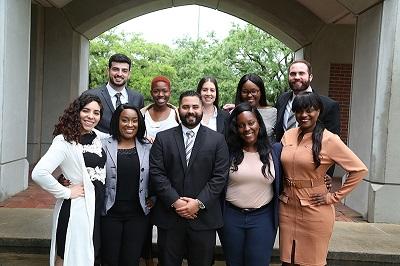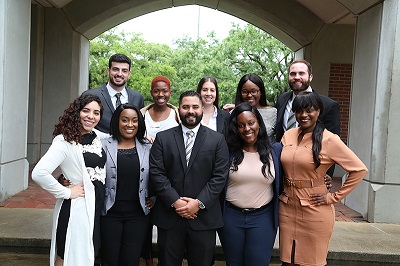Honoring Bridge students’ success


May 16, 2018
Ten students celebrated the end to a busy year Tuesday, completing their last requirement before they receive their master’s in biomedical sciences Saturday at the College of Medicine commencement ceremony.
The Bridge Program’s Class of 2018 stood before deans, department heads, mentors, Bridge administrators, faculty and staff and presented their research findings at the annual Bridge Graduation Luncheon.
The students conducted their research during their three semesters in Bridge under the guidance of mentors from the College of Medicine faculty, FSU College of Human Sciences and FSU Center on Better Health and Life for Underserved Populations.
The Bridge to Clinical Medicine Program provides a bridge into medical school for promising, hand-picked students – those whose characteristics make them good candidates for practicing primary care with underserved or minority patients in rural or inner-city communities. Often the students come from such communities themselves, and part of the Bridge requirement is to conduct a research project with a medically underserved population.
“What you focused on today was really our mission. You talked about community-based and primary-care research,” College of Medicine Dean John P. Fogarty told the students in his closing remarks. “I didn’t hear a single conversation about MRIs, CAT scans, stents or any of those major innovations. We’re talking about common things that are in the community and how common interventions are making a difference.”
A full list of projects for the Bridge Class of 2018 appears below, with faculty mentors’ names in parentheses:
• Stenia Accilien, “ACTS 2 Facilitator Follow-up with African-American Dementia Caregivers, Needs for Continuing Education and Retention Strategies” (Rob Glueckauf and Michelle Kazmer, Department of Behavioral Sciences and Social Medicine).
• Eduardo Carvalho, “Farmworker Seniority and Occupational Safety Attitudes about Heat-Related Illness” (Joe Grzywacz, Department of Family and Child Sciences).
• Brandon Davila, “The Association of Pesticide-Related Knowledge and Behavior by Gender” (Grzywacz).
• Gabriela Cintron, “Parents’ Perceptions of the Health Care Professional Encounter Concerning Their Child’s Overweight” (Angelina Sutin, Behavioral Sciences and Social Medicine).
• Zachary Cooley, “Patient-Centered Medical Home: Effects on Content of Care for Treatment of Depression” (Jeffrey Harman, Behavioral Sciences and Social Medicine).
• Shanquell Dixon, “An Assessment of the Association Between Median Income in Florida and Diabetes Self-Care” (Tyra Dark, Behavioral Sciences and Social Medicine).
• Anggie Ferrer, “Depression and Anxiety in Women: The Impact of Reproductive Stage and Socioeconomic Stats” (Heather Flynn, Behavioral Sciences and Social Medicine).
• Ashley Saint-Cyr, “Midlife and Older African-Americans with Metabolic Syndrome” (Penny Ralston, Center on Better Health and Life for Underserved Populations).
• Naomi Thelusma, “African-American Alzheimer’s Caregiver Training and Support Project 2 (ACTS 2) Pilot Study: Quantitative Outcome Analysis” (Glueckauf and Kazmer).
• Alexandria Wilkins, “The Relationship Between Life Satisfaction and Emerging Health Behaviors in Underserved Adolescents” (Ralston).
Once the Bridge students receive their master’s diplomas at graduation, they’ll return as first-year med students just 10 days later and join the M.D. Class of 2022.
Before concluding the luncheon, Associate Dean for Student Affairs Rob Campbell reminded the students of the Bridge Program’s special legacy.
“Our Bridge students, when they get into the class, become class leaders,” he said. “The majority of class presidents we’ve had here at the College of Medicine have been previous Bridge students. It’s a legacy and honor you are all stepping into.”

